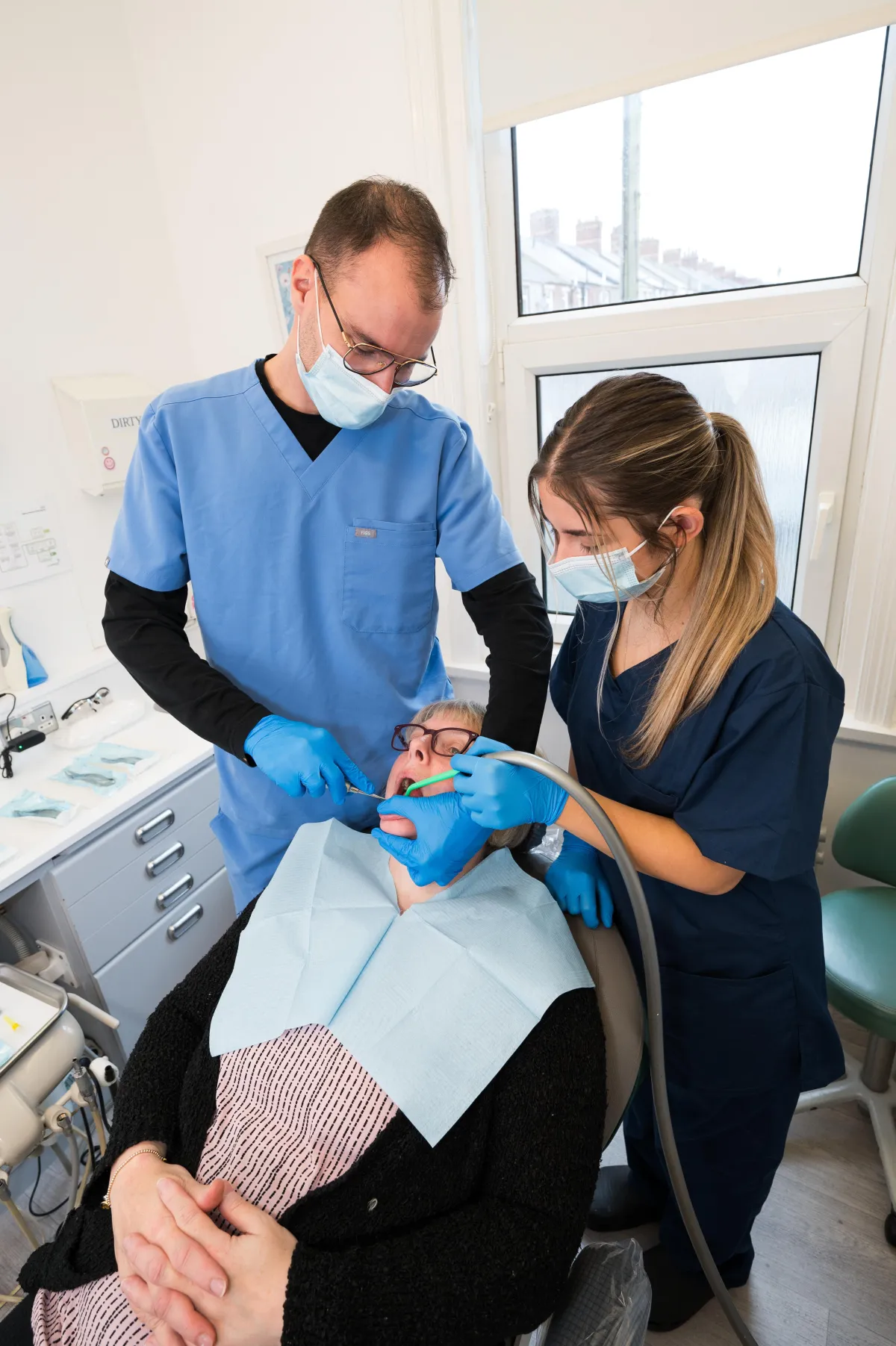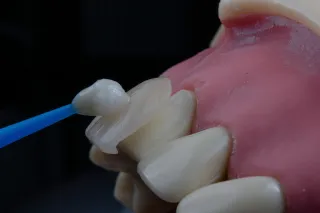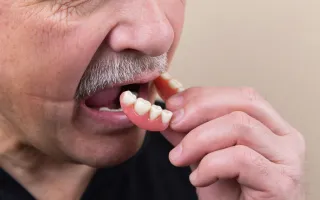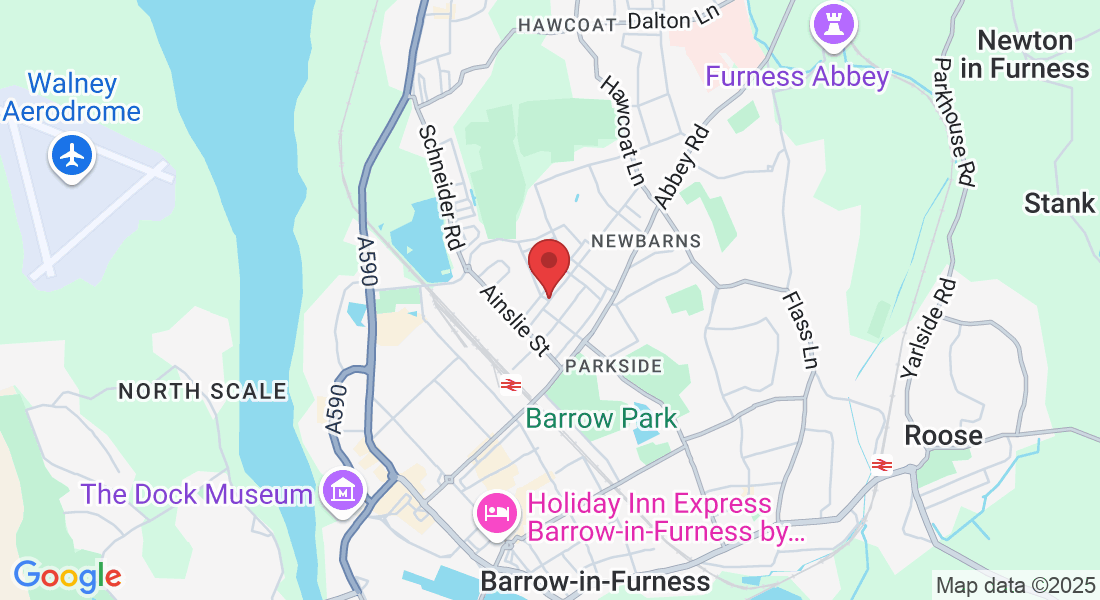Oral Prophylaxis
Oral Prophylaxis
Scale and Polish
Oral Prophylaxis
Highfield Dental Practice
At Highfield Dental Practice in Barrow-in-Furness, maintaining your oral health is our top priority. Our expert Oral Prophylaxis treatment is designed to remove plaque, calculus buildup, and surface stains while preventing gum disease and inflammation. This deep cleaning procedure, performed by our skilled Dental Hygiene Therapist, ensures your teeth and gums stay healthy, fresh, and protected against future dental issues.

Highfield Dental Practice
Oral Prophylaxis
At Highfield Dental Practice in Barrow-in-Furness, maintaining your oral health is our top priority. Our expert Oral Prophylaxis treatment is designed to remove plaque, calculus buildup, and surface stains while preventing gum disease and inflammation. This deep cleaning procedure, performed by our skilled Dental Hygiene Therapist, ensures your teeth and gums stay healthy, fresh, and protected against future dental issues.

Highfield Dental Practice
What is a Dental Hygiene Therapist?

A Dental Hygiene Therapist is a highly trained dental professional who specializes in oral hygiene and preventative care. They are also proficient in restorative dentistry and children's treatments. Their expertise ensures that you receive thorough care tailored to your needs.
Worth the value

"Highly recommend this"
- Alec Hennis
About Us
Best Dental Care in Dartford for Over 25 Years
Highfield Dental Practice has proudly served Dartford for more than two decades, offering high-quality dental care with a dedicated team of professionals. We are committed to treating each patient with personalized care, whether they need routine check-ups or advanced cosmetic procedures. Our team, led by Dr. Swati Singh, strives to uphold our reputation as the most trusted dental center in Dartford, always ensuring that our patients receive the best possible treatment in a caring and comfortable environment.

What is a Dental Hygiene Therapist?
A Dental Hygiene Therapist is a highly trained dental professional who specializes in oral hygiene and preventative care. They are also proficient in restorative dentistry and children's treatments. Their expertise ensures that you receive thorough care tailored to your needs.
Stages of Gum Disease
Stage 1: Gingivitis
The first stage of periodontal disease is gingivitis, where plaque buildup at the gumline causes inflammation. Symptoms include:
Bleeding gums
Swollen, red, or puffy gums
Painful sensations
Factors like medications, smoking, or pregnancy can mask or mimic these symptoms. Regular visits to your dentist and dental hygiene therapist every six months can help prevent gingivitis from progressing. At this stage, halitosis (bad breath) is common due to bacterial buildup.
Stage 2: Periodontitis
When gingivitis is untreated, periodontitis develops. This stage involves:
Bone and tissue breakdown
Gum recession and sensitivity
Formation of deeper pockets for plaque and calculus
This stage increases the risk of periodontal abscesses, which can cause pain, swelling, foul odors, and even systemic health risks.
Stage 3: Advanced Periodontitis
In advanced periodontitis, the damage to connective tissue and bone becomes severe. Teeth may become loose or painful, and extensive bone loss may make dental implants impossible. Risks of periodontal abscesses and systemic health issues, such as heart attack or stroke, are significantly higher.
Oral Health and Overall Well-Being
Gum disease is not just a dental issue. Research, including insights from Harvard Health, highlights that the bacteria causing periodontal disease can enter the bloodstream, leading to:
Blood vessel inflammation
Increased risk of heart attack and stroke
Tiny blood clots
Maintaining healthy gums is essential for your overall health and well-being.
What to Expect During Your Hygiene Visit
Your scale and polish appointment at Highfield Dental Practice is designed to be a comfortable and pleasant experience. From the moment you arrive, our friendly dental team will ensure you feel at ease. You’ll be provided with safety glasses and a protective bib for your comfort and cleanliness. The appointment begins with a brief examination of your gums, followed by a professional cleaning to effectively remove plaque and tartar buildup. To finish, your teeth will be polished with a special prophylaxis paste to remove surface stains, leaving them clean and sparkling. During the visit, your dental hygiene therapist will highlight any areas of concern and offer personalised advice to help you maintain optimal oral hygiene.
READY TO GIVE US A TRY?
Schedule Your Scale and Polish Appointment Today
Regular hygiene visits help maintain healthy gums and a confident smile. Contact Highfield Dental Practice in Barrow-in-Furness today to schedule your scale and polish and experience a fresh, clean mouth like never before.
0% Finance Options for Affordable Dental Care
At Highfield Dental Practice, we offer 0% finance options to help make high-quality dental care affordable and accessible for everyone. With our flexible payment plans, you can spread the cost of your treatment without the stress of upfront payments, ensuring you get the care you need without delay.


What dental services does Highfield Dental Practice offer?
At Highfield Dental Practice, we provide a wide range of dental services, including general dentistry, cosmetic treatments like teeth whitening and veneers, orthodontics (Invisalign and braces), and restorative treatments such as dental implants and crowns. Our team is dedicated to offering personalised care to meet your unique dental needs.

Do you offer emergency dental care?
Yes, Highfield Dental Practice offers same-day emergency dental care. If you’re experiencing severe pain, broken teeth, or any other urgent dental issues, contact us immediately for fast, effective treatment.

What are the payment options at Highfield Dental Practice?
We offer flexible payment options, including 0% finance plans, to make dental care affordable for everyone. Our team will guide you through the payment options to help you choose the best plan for your needs.

What is a dental check up for?
During a dental check up, or dental examination, we carry out a full hard and soft tissue assessment, oral cancer screening, and if required, we may advise some radiographs to assess where the eyes cannot see. We record all of this information in your clinical notes to monitor any changes and improvements to your mouth, and then we will inform you of our findings, and provide you with a customised treatment plan.
Why would I need x-rays?
X-rays are essential for accurate diagnosis and treatment planning appropriately for tooth decay, and gum disease. Routine x-rays are generally taken every 24 months. Radiographs also show us what is lying under the gum, and in the bone, such as impacted teeth, abscesses, cysts, and many other abnormalities. Your dentist will let you know specifically in your case why an x-ray has been advised, and of any findings.
Are x-rays harmful?
Two ‘bitewing’ radiographs, which are taken at 24 month intervals, contain the same radiation as four bananas.
How often should I attend the dentist?
Every 6 months is widely recommended by the General Dental Council, and the Care Quality Commission. This is to maintain optimum oral hygiene with regular visits to the Dental Therapist, and regularly assess the oral tissues to treat any problems before they become more serious.
Why do I need a scale and polish?
Your Dentist will recommend a scale and polish, if there are plaque or calculus deposits, gingival inflammation, and/or gum disease. They will often refer you to the Practice’s Dental Hygiene Therapist. Calculus can only be removed by a dental professional and will not come away with toothbrushing or flossing. If it is left on the teeth for a long period of time, the gums become inflamed, leading to tissue and bone loss around the teeth, at this point, gum disease becomes irreversible, and if it continues untreated, extensive bone and tissue loss occurs, which can lead to mobile teeth, loss of teeth, infections and pain.
What is a dental Implant?
Dental Implants offer a welcome alternative to dentures or bridgework that doesn’t fit well, or if a lack of natural teeth disallow a bridge. They look and function like your natural teeth, and are put in place of a missing tooth or multiple missing teeth. Implants are a metal screwlike post that is placed into the jaw, and either a crown, a bridge, or a ‘snap-in’ denture can be placed over the top.
Why should I consider dental implants?
If you are missing a tooth, and nothing is placed in it’s gap – there is a risk of overeruption of the opposing tooth as there is nothing for it to bite on, which may result in mobile teeth or further tooth loss, as well as this, the surrounding teeth can migrate into it’s place over time, this can make cleaning the area difficult, and after some time, gap replacement may not be an option due to lack of space. Dentures overtime can become ill-fitting, or cause discomfort, or simply, you may not be able to get used to them – implants are the Gold Standard for tooth replacement as they are fixed, and the closest option to a natural tooth.
How painful is getting a dental implant?
Patient’s experience no pain during Implant placement, and our patient’s feedback tell us that it is similar, or less discomfort than having a tooth extraction. You can expect to feel some pressure when the implant is placed, and some post-operative aching, similar to a bruise.
How can I make my teeth whiter?
We offer an at home teeth whitening kit, it is a one time payment for your trays and kit, and when you would like a top up, the whitening gels are available to buy at the practice. Teeth whitening is a simple and effective treatment to lighten the teeth by up to eight shades lighter, and it is customisable to you – once you are happy with the shade, you can stop whitening them.
Is teeth straightening only suitable for children?
No, Invisalign is a treatment for any age, it is effective for adults who would like to improve the appearance of their smile, whether it is due to crowding, spacing, overbites, underbites, crossbites, or ‘heavy’ bites which are prone to cause the teeth to chip over time. As we age, the jaw naturally becomes more narrow which can cause the teeth to overlap and become crowded, Invisalign is also suitable for cases like this.
Why have I been advised to have a filling when I have no pain?
Tooth decay, in it’s early stages, will usually not cause any problems or pain - at this stage, it is possible to remove and place a filling as it is only affecting the enamel and/or dentine. If the decay or defect is left untreated, and begins causing pain or hypersensitivity, the treatment options become limited, the dentine is affected, and has reached the pulp (nerve) chamber; meaning a root canal treatment may be advised to save the tooth, though your only option at this stage may be to extract the tooth.
Why did pain come back after I had antibiotics?
Unlike other infections in the body, where antibiotics will usually resolve an infection permanently, teeth are quite different. As the cavity has affected the nerve, this causes an infection to build up at the root; antibiotics will temporarily reduce this infection, minimising pain, but after some time it will return as the nerve is still affected. Your dentist will have advised you on the treatment options to permanently resolve the infection.
Why can’t I have a filling instead of Root Canal Treatment?
A filling is to treat a cavity only in the enamel or the dentine. If you have been advised a root canal treatment, the nerve has been affected. If a filling is placed in this circumstance, it essentially ‘suffocates’ the nerve, causing infection to build at the root, usually very painful, and may cause facial swelling. The only way to treat a tooth infection, is with a root canal treatment, as the nerve is removed and the tooth is preserved in the mouth.
Post Address and Mail
Email: [email protected].uk
Get In Touch
Assistance Hours
------------------------------------------------
Christmas Opening Times 🎄:
Wednesday 24th December : 8:30am – 1:00pm
Thursday 25th December : Closed
Friday 26th December : Closed
Monday 29th December : 8:30am – 5:30pm
Tuesday 30th December : 8:30am – 5:30pm
Wednesday 31st December : 8:30am – 1:00pm
Thursday 1st January : Closed
Friday 2nd January : 8:30am – 5:30pm
------------------------------------------------
Normal Hours:
Monday – Friday : 9:00am – 5:30pm
Saturday – Sunday: Closed
Phone Number:

